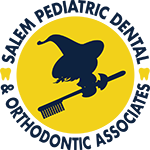
Why should I choose a pediatric dentist instead of a family dentist?
What should I use to clean my baby’s teeth?
Why are baby teeth important?
What causes tooth decay (cavities)?
How can I prevent decay caused by nursing or bottle use?
How can parents help prevent tooth decay?
How to dental sealants work?
What is silver diamine fluoride (SDF)?
Are thumbsucking and pacifier habits harmful for a child’s teeth?
How can I protect my child’s teeth during sports?
What should I do if my child has a toothache?
When should I take my child to the dentist for the first check-up?
In order to prevent dental problems and establish a dental home, your child should see a pediatric dentist when the first tooth appears, or no later than his/her first birthday.
Why should I choose a pediatric dentist instead of a family dentist?
Pediatric dentists are the pediatricians of dentistry. A pediatric dentist has two to three years specialty training following dental school and limits his/her practice to treating children only. Pediatric dentists are primary and specialty oral care providers for infants and children through adolescence, including those with special health needs.
What should I use to clean my baby’s teeth?
A toothbrush will remove plaque bacteria that can lead to decay. Any soft-bristled toothbrush with a small head, preferably one designed specifically for infants, should be used at least once a day at bedtime. Training (toddler) toothpaste can be used for patients under two years of age as it is safe to swallow.
Why are baby teeth important?
Primary or “baby” teeth are important for many reasons. Not only do they help children speak clearly and chew naturally, they also aid in forming a path that permanent teeth can follow when they are ready to erupt. Some primary teeth are present until a child is 12 years old or older. Proper care of baby teeth is essential for the overall health of your child.
What causes tooth decay (cavities)?
Dental plaque is a collection of sticky bacteria that constantly live on all teeth. When we eat, sugars in our food interact with the bacteria in plaque to produce acid. With time and repeated acid production, the tooth begins to break down and a cavity forms.
How can I prevent decay caused by nursing or bottle use?
Avoid nursing children to sleep or putting anything other than water in their bed-time bottle. Also, learn the proper way to brush and floss your child’s teeth. Take your child to a pediatric dentist regularly to have his/her teeth and gums checked. The first dental visit should be scheduled by your child’s first birthday.
How can parents help prevent tooth decay?
Parents should take their children to the dentist regularly, beginning with the eruption of the first tooth. Then, the dentist can recommend a specific program of brushing, flossing, and other treatments for parents to supervise and teach to their children. These home treatments, when added to regular dental visits and a balanced diet, will help give your child a lifetime of healthy habits and healthy teeth.
How to dental sealants work?
Sealants work by filling in the grooves and pits on the chewing surfaces of the teeth. This shuts out food particles that could get caught in the teeth, causing cavities. The application is fast and comfortable and can effectively protect teeth for many years.
What is silver diamine fluoride (SDF)?
Silver diamine fluoride is a topical medicament (drug) used to treat and prevent dental caries (cavities) and relieve tooth sensitivity. Read more about the use of SDF in these articles from the New York Times and the Today Show and on this information sheet.
Are thumbsucking and pacifier habits harmful for a child’s teeth?
Thumb and pacifier sucking habits will generally only become a problem if they go on for a very long period of time. Most children stop these habits on their own, but if they are still sucking their thumbs or fingers past the age of three, a mouth appliance may be recommended.
How can I protect my child’s teeth during sports?
Soft plastic mouthguards can be used to protect a child’s teeth, lips, cheeks and gums from sport related injuries. A custom-fitted mouthguard developed by a pediatric dentist will protect your child from injuries to the teeth, face and even provide protection from severe injuries to the head.
What should I do if my child has a toothache?
Thoroughly clean the area around the tooth using a toothbrush and toothpaste. Rinse the mouth with warm salt water and use dental floss to remove any trapped food between the teeth. DO NOT place aspirin on the gums or tooth. This will cause a burn to the gum tissues. If there is swelling, apply cold to the outside of the face. Give acetaminophen (Tylenol) or ibuprofen (Motrin) for pain and call our office to make arrangements for evaluation.
